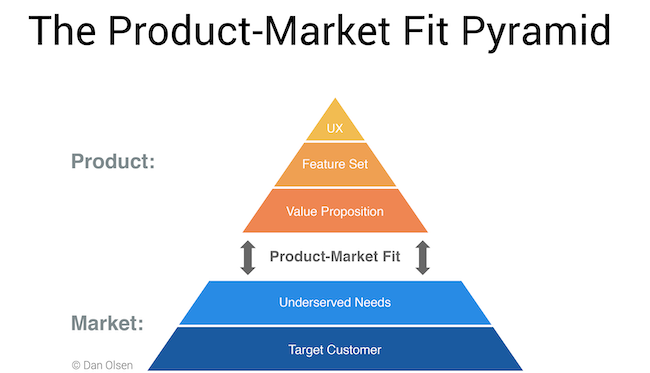
THE HOW-TO GUIDE FOR CREATING PRODUCTS THAT CUSTOMERS LOVE
Hardcover
AmazonEbook
Audiobook
AudibleBulk orders
PorchlightHOW TO ACHIEVE PRODUCT-MARKET FIT
The Lean Product Playbook is a practical guide to building products that customers love. Whether you work at a startup or a large, established company, we all know that building great products is hard. Most new products and features fail. This book helps improve your chances of building successful products through clear, step-by-step guidance and advice.
Do you have the audiobook version of The Lean Product Playbook? Check out the enhanced Audiobook Companion PDF.
The book begins by explaining the Product-Market Fit Pyramid: an actionable model that defines what product-market fit means.

The book describes the Lean Product Process: an easy-to-follow methodology for iterating your way to product-market fit. It walks you through how to:
♦ Determine your target customers
♦ Identify underserved customer needs
♦ Create a winning product strategy
♦ Decide on your Minimum Viable Product (MVP)
♦ Design your MVP prototype
♦ Test your MVP with customers
♦ Iterate rapidly to achieve product-market fit
Table of Contents
Introduction: Why Products Fail and How Lean Changes the Game
Part I: Core Concepts
1. Achieving Product-Market Fit with the Lean Product Process
2. Problem Space versus Solution Space
Part II: The Lean Product Process
3. Determine your Target Customers (Step 1)
4. Identify Underserved Customer Needs (Step 2)
5. Define your Value Proposition (Step 3)
6. Specify your Minimum Viable Product (MVP) Feature Set (Step 4)
7. Create your MVP Prototype (Step 5)
8. Apply the Principles of Great User Experience (UX) Design
9. Test your MVP with Customers (Step 6)
10. Iterate and Pivot to Improve Product-Market Fit
11. An End-to-End Lean Product Case Study
Part III: Beyond MVP
12. Build your Product using Agile Development
13. Measure Your Key Metrics
14. Use Analytics to Optimize your Product and Business
15. Conclusion
Acknowledgements
References
Resources
Index
About the Author